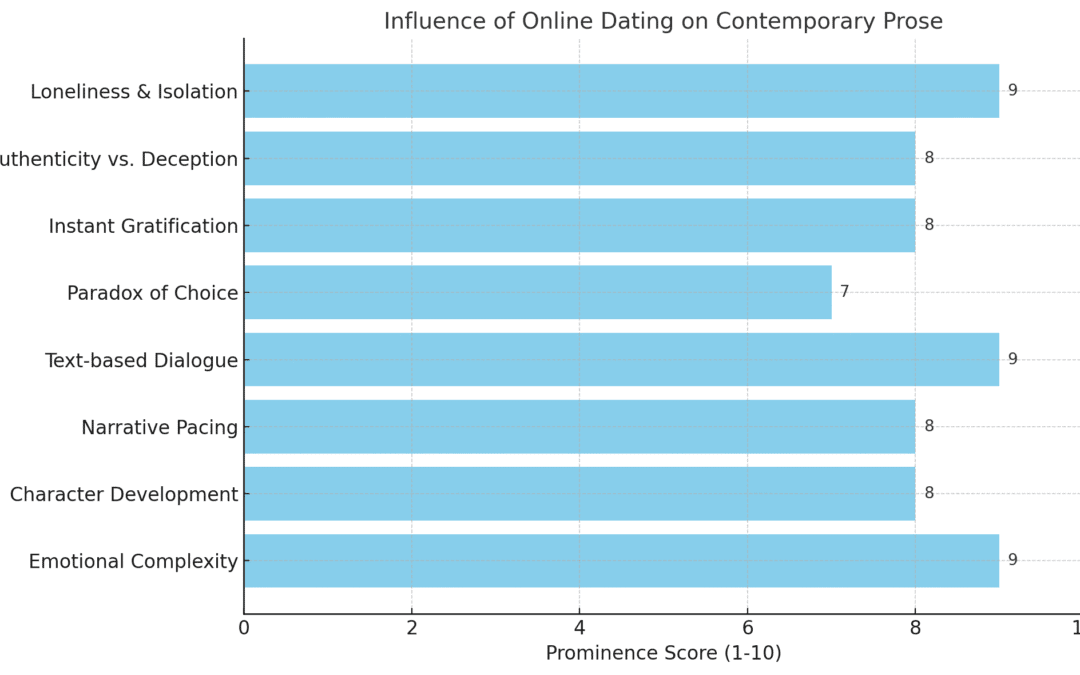Online Dating’s Literary Drift
Online dating produces asymmetrical intimacy at scale. The match is both instant and indistinct, one-dimensional until messaged, responsive only through curated affect. In prose, this interface yields characters who calibrate themselves with the precision of code—optimizing bios like corporate mission statements, trimming personality to fit screen width. They vanish mid-thread, reappear under alternate usernames, split attention across platforms. Every action registers like a delayed echo of desire, digitally framed and emotionally estranged.
Romantic Narrative as Glitch Pattern
Fiction that absorbs the mechanics of dating apps develops jagged rhythms. Swipe-left rejection interrupts continuity. Mutual attraction initiates, stalls, resumes mid-scroll. Dialogue collapses into screenshots and speech fragments. Traditional arcs disintegrate under typographic brevity. Romance no longer unfurls; it flickers, times out, double-taps itself into ghosted silence. This non-linearity mirrors the structural ruptures in contemporary prose, where storytelling follows the logic of browser tabs: simultaneous, incomplete, self-interrupting.
Textual Seduction and Filtered Selfhood
In literary representations, the profile becomes a page of performance, the match a publishing deal with unread fine print. Characters write to impress algorithms, not partners. Syntax mimics swipe-speed cognition—compressed, strategic, impressionistic. Their identities fracture across platforms, curated into distinct lexicons of emojis, hashtags, and evasive metaphors. These stylized distortions echo the hyper-curated desires in best love poetry books, where voice is less revelation than mirage, constructed to evoke recognition without exposure.
Emotional Economies in Swipe Culture
Desire now orbits convenience. Literature captures this emotional transactionality through clipped exchanges, misplaced attachments, algorithms posing as fate. Affection gets gamified—characters toggle availability like inventory, discard matches like expired coupons. Passion converts to interface latency; rejection to inactivity. Novels and short stories increasingly track these transactions, embedding them within consumerist critiques. In these economies, romantic ambition becomes indistinguishable from app engagement, and heartbreak resembles a malfunction, not a climax—like in several sad romance novels where abandonment is no longer dramatic, only inevitable.
Syntax of Ghosting
Narrative tension now hinges on absence, not confrontation. The ghost no longer signifies the supernatural but the unmessaged, the unread, the unseen. Entire emotional arcs unfold without voice, only timestamped silences and half-typed thoughts. Fiction adapts to this dissonance with whitespace, dangling punctuation, monologues framed as chats. Ghosting operates as a structural device, replacing climactic dialogue with omission. Its emotional cadence mimics the abandoned stanzas in sad poetry books, where resolution is replaced by vanishing.
Erotics of Ambiguity
Sexual encounters in app-based narratives arrive pre-decided, yet emotionally underdeveloped. Physicality precedes sentiment. Lust precedes comprehension. Description fractures: smell, flash, disconnect. Characters narrate erotic experiences like transaction logs, emotionally adjacent but analytically precise. This creates an affective contradiction—a scene of contact narrated with clinical detachment. These dissonant passages recall the tonal experimentation in contemporary poetry, where sensuality avoids sentimentality by foregrounding fragmentation over climax.
Romance as Interface Simulation
Online dating recasts courtship as system interaction. Affection adapts to GUI metaphors—loading, buffering, logging in. In fiction, this logic produces characters who articulate desire through UX metaphors. They click better than they kiss. Connection becomes a pattern of response rates, punctuation density, emoji choices. Novelists transform GUI experience into affective texture, inscribing digital interface into the structure of longing itself. In stories emerging from this matrix, love is filtered, lagged, queued—never singular, never analog.
Epistolary Reimagined as Screenshot Archive
The modern love letter transposes into chat logs, paragraph spacing into dot-dot-dot typing animations. Fictional correspondence no longer flows through paper but flickers on screens, screen-captured, reforwarded, misunderstood through timestamp shifts. Lovers archive threads, reread inconsistently, misattribute tone. Literary memory becomes screenshot memory—selective, searchable, endlessly revisitable but never tactile. This reformatting recontextualizes the lyricism of rhyming love poems, where sentiment is preserved in rhythm, whereas online affection decays in scrollable silence.
Algorithm as Character Motivator
No human author defines the match. The algorithm casts its own logic over character arcs. Fiction that includes dating apps implicitly introduces a secondary narrator—an opaque curator of possibility. Characters respond not to each other but to algorithmic hierarchies of desirability. This dynamic recasts narrative causality, delegating romantic fate to machine learning. It parallels the editorial voice in anthologies of modern poets, where thematic cohesion arises from curatorial pattern, not chronological storytelling.
Confession as Spectacle
Digital intimacy converges with confessional exhibition. Fiction inspired by online dating often reveals private desire within public interfaces. Narratives incorporate staged vulnerability—characters who reveal trauma or fetish to solicit engagement, not empathy. These performative revelations resemble the intimate disclosures in cheating wife confessions, where narration blends truth with titillation, memory with fantasy, rendering sincerity indistinguishable from theater.


